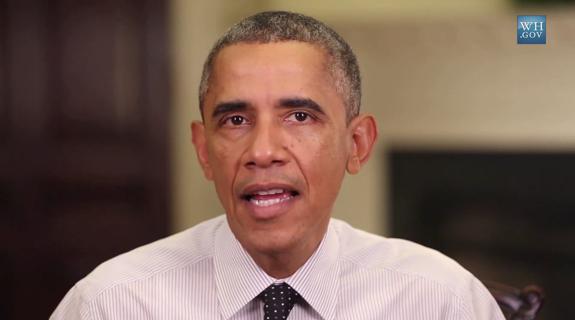President Barack Obama on Monday took a firm stance on net neutrality, saying that all content providers should have equal access to the Internet.
“Simply put: No service should be stuck in a ‘slow lane’ because it does not pay a fee,” Obama said in a video statement released by the White House on Monday. “That kind of gatekeeping would undermine the level playing field essential to the Internet’s growth.”
Specifically, Obama recommended that the FCC regulate Internet Service Providers (ISPs) under Title II of the Telecommunications Act, essentially treating them like utility providers. ISPs, which include broadband companies such as Comcast and Time Warner Cable, quickly stated their opposition to Obama’s plan.
“We are stunned the President would abandon the longstanding, bipartisan policy of lightly regulating the Internet and call for extreme Title II regulation,” said Michael Powell, chairman of the National Cable and Telecommunications Association, in a statement. “The cable industry strongly supports an open Internet, is building an open Internet, and strongly believes that over-regulating the fastest growing technology in our history will not advance the cause of Internet freedom. There is no dispute about the propriety of transparency rules and bans on discrimination and blocking. But this tectonic shift in national policy, should it be adopted, would create devastating results.”
Last May, Tom Wheeler, chairman of the Federal Communications Commission (FCC), proposed new rules that would allow content providers to pay ISPs, which include broadband companies such as Comcast and Time Warner Cable, for faster Internet access, a proposal that’s become known as “paid prioritization.”
Consumer advocates have been rallying people to let Washington know of their opposition to that plan and have been fairly successful, with 4 million comments flooding the FCC’s Web site on the issue.
Companies such as Netflix already have “interconnection deals” with ISPs, paying Comcast, Verizon and AT&T to connect directly with their servers and provider faster and smoother service for their customers.
While the White House is firmly backing net neutrality, it maintains that “the FCC is an independent agency, and ultimately this agency is theirs alone,” Obama said in a statement.
That said, Obama also proposed a set of “bright-line rules” to govern Internet access, including:
“No blocking. If a consumer requests access to a website or service, and the content is legal, your ISP should not be permitted to block it. That way, every player — not just those commercially affiliated with an ISP — gets a fair shot at your business.
No throttling. Nor should ISPs be able to intentionally slow down some content or speed up others — through a process often called “throttling” — based on the type of service or your ISP’s preferences.
Increased transparency. The connection between consumers and ISPs — the so-called “last mile” — is not the only place some sites might get special treatment. So, I am also asking the FCC to make full use of the transparency authorities the court recently upheld, and if necessary to apply net neutrality rules to points of interconnection between the ISP and the rest of the Internet.
No paid prioritization. Simply put: No service should be stuck in a “slow lane” because it does not pay a fee. That kind of gatekeeping would undermine the level playing field essential to the Internet’s growth. So, as I have before, I am asking for an explicit ban on paid prioritization and any other restriction that has a similar effect.”
Share prices for several broadband companies, who stand to make money should the government allow them to charge content providers for faster access, fell after Obama released the statement.
Read more: WhiteHouse.gov, Broadcasting & Cable, Reuters, Variety
Brief Take: Obama’s statement sets up quite a battle between ISPs and content providers as the FCC tries to find a middle ground.
Tags:













































__twocolumncontent.jpg)











